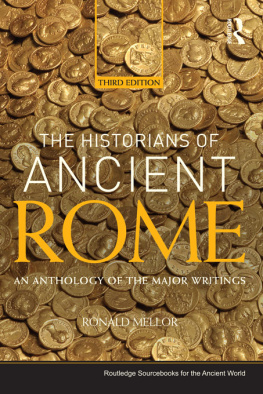Livy - The History of Rome, Books 1-5
Here you can read online Livy - The History of Rome, Books 1-5 full text of the book (entire story) in english for free. Download pdf and epub, get meaning, cover and reviews about this ebook. year: 2012, publisher: Hackett Publishing Company, Inc., genre: Art. Description of the work, (preface) as well as reviews are available. Best literature library LitArk.com created for fans of good reading and offers a wide selection of genres:
Romance novel
Science fiction
Adventure
Detective
Science
History
Home and family
Prose
Art
Politics
Computer
Non-fiction
Religion
Business
Children
Humor
Choose a favorite category and find really read worthwhile books. Enjoy immersion in the world of imagination, feel the emotions of the characters or learn something new for yourself, make an fascinating discovery.
The History of Rome, Books 1-5: summary, description and annotation
We offer to read an annotation, description, summary or preface (depends on what the author of the book "The History of Rome, Books 1-5" wrote himself). If you haven't found the necessary information about the book — write in the comments, we will try to find it.
Livy: author's other books
Who wrote The History of Rome, Books 1-5? Find out the surname, the name of the author of the book and a list of all author's works by series.
The History of Rome, Books 1-5 — read online for free the complete book (whole text) full work
Below is the text of the book, divided by pages. System saving the place of the last page read, allows you to conveniently read the book "The History of Rome, Books 1-5" online for free, without having to search again every time where you left off. Put a bookmark, and you can go to the page where you finished reading at any time.
Font size:
Interval:
Bookmark:
THE HISTORY
OF ROME
Books 15
LIVY
THE HISTORY
OF ROME
Books 15
Translated, with Introduction and Notes, by
Valerie M. Warrior
Hackett Publishing Company, Inc.
Indianapolis/Cambridge
Copyright 2006 by Hackett Publishing Company, Inc.
All rights reserved
Printed in the United States of America
15 14 13 12 11 2 3 4 5 6 7
For further information, please address:
Hackett Publishing Company, Inc.
P.O. Box 44937
Indianapolis, IN 46244-0937
www.hackettpublishing.com
Cover design by Abigail Coyle
Text design by Jennifer Plumley and Chris Downey
Composition by Agnews, Inc.
Printed at Versa Press, Inc.
Library of Congress Cataloging-in-Publication Data
Livy.
[Ab urbe condita. Liber 15. English]
The History of Rome, books 15 / Livy ; translated, with introduction
and notes, by Valerie M. Warrior.
p. cm.
Includes bibliographical references and index.
ISBN-13: 978-0-87220-724-0 (cloth)
ISBN-10: 0-87220-724-2 (cloth)
ISBN-13: 978-0-87220-723-3 (paper)
ISBN-10: 0-87220-723-4 (paper)
1. RomeHistoryKings, 753510 B.C. 2. RomeHistory
Republic, 510265 B.C. I. Warrior, Valerie M. II. Title.
PA6452.A5 2006
937dc22
2006043351
ePub ISBN: 978-1-60384-872-5
Livy: His Life, Work, and Times
Titus Livius, a Roman citizen, was born in 64 or 59 BCE in Patavium (modern Padua, Padova), the wealthiest city in the province of Cisalpine Gaul (northern Italy). Nonetheless, he must have spent considerable time in Rome, given his familiarity with Roman topography, legends, and monuments, which is evident throughout the surviving books of his history.
Although Livys narrative reveals a keen awareness of politics, there is no evidence that he held political office. Nor is there any known connection with the other major literary figures of his time, such as Virgil (7019 BCE), Horace (658 BCE), or Ovid (43 BCE17 CE). Asinius Pollio (see more later in Introduction), a contemporary historian whose work has not survived beyond a few quotations, made a derogatory remark about Livys patavinitas, possibly alluding to his use of provincial rather than urbane figures of speech or to the moral rectitude for which Patavium was famous. Neither of these references, however, indicates that Livy had close personal ties with either Augustus or the young Claudius, as has often been assumed.
Livys early years would likely have been influenced by the political upheavals and civil wars that were fought not only in Italy but throughout the Mediterranean world: first the struggle between Pompey and Caesar in the early 40s BCE and then, after Caesars assassination in 44 BCE, the struggle for supremacy between Antony (83?30 BCE) and Octavian, who later became the emperor Augustus. Though Octavian, Julius Caesars great-nephew and posthumously adopted son, was only nineteen years old at the time of Caesars assassination, he was not slow to assert himself, feuding with Antony who had assumed control after Caesars death. Then Octavian raised a private army of Caesarian loyalists and successfully demanded the consulship of 43 BCE after both consuls perished in northern Italy at the battle of Mutina. During the fighting in this area, the people of Patavium refused to cooperate with Asinius Pollio who, as governor of Cisalpine Gaul, was attempting to enlist the loyalty of the Patavians on Antonys behalf. Pollios later gibe about Livys patavinitas might also stem from this incident.
Octavian, now consul, made an alliance with Antony and Lepidus (early 80s13 or 12 BCE), another of Caesars associates, to form the Second Triumvirate. Proscriptions were authorized, listing the triumvirs enemies who were to be killed with impunity. Among the victims was the orator, writer, and former consul Cicero (10643 BCE), who had attacked Antony in a series of speeches known as the Philippics. Strife among the triumvirs soon developed between Antony and Octavian. In an attempt to assert himself, Lepidus seized power in Sicily in 36 BCE. Octavian soon disarmed and removed Lepidus from the triumvirate, but not from the office of pontifex maximus. Lepidus spent the rest of his life in exile. Antonys military ambitions in the east and his liaison with Queen Cleopatra of Egypt (6930 BCE) ultimately led to war with Octavian. The suicides of Antony and Cleopatra after their defeat at Actium in 31 BCE left Octavian as the virtual master of the Roman world. But his victory did not bring an immediate end to fears of further civil strife. In 27 BCE, he received the title of Augustus and declared that he had returned all his powers to the senate and the Roman people, thus nominally restoring the republic. But doubts about the stability of Augustus restoration of the republic would have persisted throughout the 20s and well into the following decade, only to be replaced with concern for what would happen in the event of his death. It is only with hindsight that we know that Augustus succeeded in bringing peace to the Roman world. For Livy and his contemporaries there was no such certainty.
What opportunities were there in Rome for an educated but obscure young man from the province of Cisalpine Gaul in such turbulent times? In an earlier generation, Cicero, who came from a small town in central Italy, had established himself as the leading orator in Rome, achieving the consulship, though none of his ancestors had held that office. At the time of Ciceros death in the proscriptions of 43 BCE, the year in which the Patavians opposed Asinius Pollio, Livy would have been fifteen years old (assuming he was born in 59 BCE) and about to proceed from his studies in language and literature to the study of rhetoric. In more settled times, he would have been sent to a rhetor in Rome and then to Athens or Rhodes to study with the leading rhetoricians and philosophers. Whether Livy completed his education in Patavium or Rome is unknown, but it seems unlikely that he went to Greece. Whatever the case, the speeches that he composed for various figures of Roman history are proof of his rhetorical expertise, an outstanding example of which is the speech of Camillus at the end of Book 5.
By the late 40s and early 30s BCE, making a name as an orator and then entering political life was no longer a viable option for a young man. Cicero, however, had observed that Roman literature was deficient in history, a genre that he remarked was especially close to oratory but had been overlooked or neglected by his fellow Romans. The works of the early Roman historians were, in his opinion, lifeless. Ciceros remarks may well have been Livys inspiration.
The date at which Livy began to compose his History of Rome is much disputed, since there are no references that can be dated precisely. In the Preface, references to the evils that our age has seen, the consequent anxiety (Pref. 5), the inability to bear our own vices and their remedies (Pref. 9), and the overall pessimism are too general to permit speculation about the date of its composition. These allusions merely reflect the uncertainty and apprehension that were prevalent throughout the 30s and 20s BCE. Nor is it inconceivable that the Preface did not reach the polished form in which we now have it until after the first five books had been completed.
Within the narrative the evidence for dating the composition of the first pentad (Books 15) is sparse and imprecise. There are two references to Caesar Augustus (1.19 and 4.20), indicating that these passages were written after January 27 BCE, when Octavian took the name Augustus. In Book 1 Livy refers to a closing of the temple of Janus after the war at Actium by Caesar Augustus. The reference in Book 4 indicates that the pentad was still incomplete in 27 BCE.
Two references in Books 9 and 28 suggest that Livy had written at least the second pentad by the time of the publication of the first five books. A reference to the conquest of Spain under the leadership and auspices of Augustus Caesar (28.12) indicates that Book 28 was written before 19 BCE, when Agrippa began another series of campaigns in Spain.
Next pageFont size:
Interval:
Bookmark:
Similar books «The History of Rome, Books 1-5»
Look at similar books to The History of Rome, Books 1-5. We have selected literature similar in name and meaning in the hope of providing readers with more options to find new, interesting, not yet read works.
Discussion, reviews of the book The History of Rome, Books 1-5 and just readers' own opinions. Leave your comments, write what you think about the work, its meaning or the main characters. Specify what exactly you liked and what you didn't like, and why you think so.









